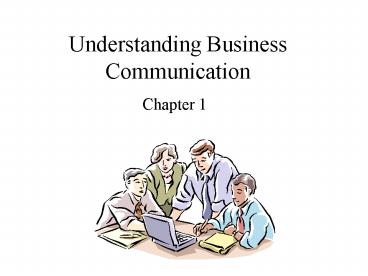Understanding Business Communication - PowerPoint PPT Presentation
1 / 24
Title:
Understanding Business Communication
Description:
Cool, awesome, funky, groovy. What are some you use? ... Age, culture, socioeconomic backgrounds. Inappropriate Emotions. Anger can prevent any message ... – PowerPoint PPT presentation
Number of Views:105
Avg rating:3.0/5.0
Title: Understanding Business Communication
1
Understanding Business Communication
- Chapter 1
2
Communications in Organizations
- An organization is a group of people working
together to achieve a communication goal. - Communication is a vital part of that process.
3
Communications in Organizations
- Research by the National Association of Colleges
and Employers (NACE) identified the top ten
characteristics employers seek in job candidates.
Number 1 was communication skills, followed by
motivation/initiative and teamwork skills.
4
A survey of 224 recent business graduates ranked
communication as the most important area of
knowledge both for securing employment and after
graduation for advancement and promotions. A
survey of 1,000 white- and blue-collar workers
found that the most frequent cause of workplace
resentment and misunderstandings is poor
communication.
5
Eighty percent of the managers at 402 firms
surveyed nationwide said that most of their
employees need to improve their writing skills,
up from 65 the previous year. But only 21 of
the firms offered training in writing
skills. Clearly, good communication skills are
crucial to your success in the organization.
Competent writing and speaking skills will help
you get hired, perform well, and earn promotions.
. . .These same skills will also achieve your
personal and social goals. Are communication
skills important to knowledge workers in the
computer age?
6
Communication
The process of sending and receiving messages.
Business Communication
The process of sending and receiving messages for
and about business.
7
Components of Communication
- Stimulus
- Filter
- Message
- Medium
- Destination
- Feedback
8
Verbal Communication
- Oral
- Speaking, tone, accent, inflection, pauses
- 60 of all communication problemspoor listening
- Written
- Memorandum
- Letters
- Reports
- Newsletters, bulletin-board info., contracts
9
Formal Communication Network
Upward
Cross-Channel
Downward
Horizontal
10
Informal Communication
- Grapevine transmission of
- information through nonofficial
- channels within an organization.
- Most information passed is business related.
- The information generally passes rapidly.
- The grapevine is used most when change is taking
place. - The grapevine is a normal, vital part of every
organization.
11
Barriers to Communication
- Inadequate Knowledge or Vocabulary
- Net present value
- CNA
- Osteoporosis
- Differences in Interpretation
- Denotation dictionary meaning cool
- Connotation subjective, emotional meaning cool
12
Barriers (continued)
- Language Differences
- China, finger-lickin good translated to So
good you suck your fingers. - Puerto Rico, Chevy Nova name translates to It
doesnt go. - Documents should be translated into second
language and then retranslated into English.
13
Barriers (continued)
- Inappropriate Use of Expressions
- Slang short-lived expressions used by specific
groups of people - Cool, awesome, funky, groovy
- What are some you use?
- Jargon technical terminology within specialized
groups - WYSIWYG, TCP/IP, Digital vs. Analog
14
Barriers (continued)
- Euphemism inoffensive expressions used to
lessen unpleasant word. - Passed away or expired for died
- Abstractions Identifies an idea or feeling
versus Concrete touch and feel - Communication vs. letter
- Few, many vs. 2 and 500
15
Barriers (continued)
- Polarization every situation has two sides with
no middle ground. - Everything is black and white there is no gray.
16
Nonverbal Barriers
- Inappropriate or Conflicting Signals
- Well-qualified administrative assistant applicant
with spelling error on resume - Differences in Perception
- Age, culture, socioeconomic backgrounds
- Inappropriate Emotions
- Anger can prevent any message
- from being received
17
Nonverbal Barriers (continued)
- Distractions Noise
- Heat, light, hungry, equipment noises
18
Ethics and Communication
- Defamation injures a persons good name, is
false, and is communicated to others - Slander oral communication
- Libel written communication
- Invasion of Privacy using someones personal
information without permission
19
Ethics (continued)
- Fraud inducing someone to give up something of
value. - Deliberately giving false information
- Leaving out information
- Misrepresentation giving a false statement
innocently with no intent to deceive the other
party.
20
Ethical Considerations
- Is this message true?
- Does it exaggerate?
- Does it withhold or obscure information?
- Does it promise something that cannot be
delivered? - Does it betray a confidence?
- Does it play unduly on the fears of the reader?
- Does it reflect the wishes of the organization?
21
3Ps Model
- Problem defines the situation and discusses the
need for a particular communication task - Process series of questions that provides
step-by-step guidance for accomplishing the
specific communication task - Product the result or the finished document
22
Summary
- Business Communicationsending and receiving
messages for and about business. - Component of Communication stimulus, filter,
message, medium, destination, and feedback
23
Summary
- Verbal Communication oral and written
- Nonverbal Communication signals, emotions,
distractions - Directions of Communication upward, downward,
horizontal, and cross-channel - Barriers to Communication
24
Summary
- Ethics and Communication defamation, invasion
of privacy, and fraud and misrepresentation - Problem, Process, Product
- Does the way you communicate affect your life?































